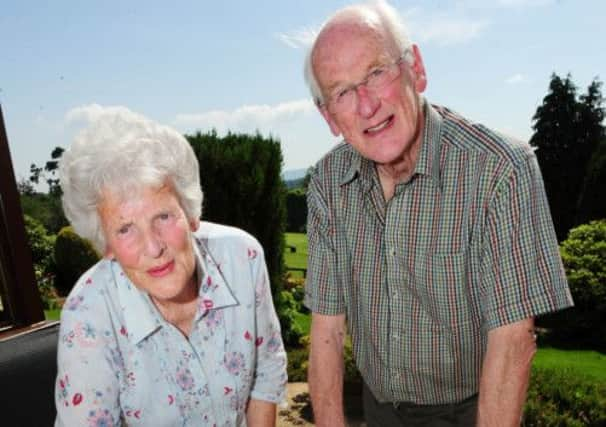Andy Murray’s grandad ‘banned from playing tennis’


For just as a teenaged Murray faced the dilemma of choosing between football and tennis as a career, so did his tennis champion grandfather face a similar choice in his youth.
Except that we will never know how good a tennis player Erskine might have been, for as he revealed to The Scotsman yesterday, he was banned from playing his favourite sport by the game’s authorities shortly after he signed as a professional footballer with Hibs.
Advertisement
Hide AdAdvertisement
Hide Ad“I was trying to play tennis, but they wouldn’t let me because I was a professional footballer,” said Erskine.
“The tennis authorities were the worst for keeping the barriers between amateurs and professional. If you were a professional sportsperson of any kind, you were banned. I could play wherever I wanted, but I wasn’t allowed to play competitive tennis, so I missed out on that for many years.”
Now 81, Erskine recalled that he signed for Hibs after he did his National Service in the Army, and that was the end of his fledgling tennis career.
“When you consider the standard of tennis in Scotland back in the 1950s, I don’t suppose I was too bad,” he said modestly, “but judged against the standard nowadays it was awful.
“I loved tennis, no question about that, but I didn’t enjoy the practice and training and running about the country and having to do this or that, quite the opposite from my grandson.
“And then it turned out that I was never any good at football anyway.”
There he is being too modest. Erskine played for Hibs from 1952 to 1954 just after the time when the manager, Hugh Shaw, had built a squad that had won the league title three times in five seasons with the Famous Five being their formidable – indeed, some would say unmatched – forward line.
Erskine trained and played at the same time as studying to become an optician – most players back then had second jobs as professionals’ wages were not comparable to today’s cash bonanzas.
Advertisement
Hide AdAdvertisement
Hide AdDescribed as “a fine stylish back”, Erskine may have made only a handful of first-team appearances, but one of them was in an East of Scotland Shield final, and he did play regularly in the second team at a time when reserve football enjoyed much more prestige than it does now.
The late Eddie Turnbull, member of the Famous Five and legendary Hibs manager, recalled Erskine the footballer after he met Andy Murray at Easter Road some years ago. “No bad but [he] liked his tennis better,” was Turnbull’s typically perceptive comment.
It wasn’t just Turnbull that picked up on Erskine’s impressive ability with a tennis racket. An extract from a review of Hibs’ 1952/53 season, obtained by The Scotsman this week, profiled all the players at Easter Road, and it concluded the section on Erskine with the words “he is a very useful tennis player”. No one knew 60 years ago, of course, that his family would produce a Wimbledon champion.
Erskine went on to play for Cowdenbeath and had two spells with Stirling Albion, but tennis remained his first love – after his wife of 56 years, former tennis champion Shirley, of course – while he succeeded in his profession as an optician.
He encouraged his grandson in his footballing pursuits: “Andy was playing in one of the kids teams that were feeder clubs for Rangers, Gairdoch United, when he was 11 or so, and we used to take him to his matches.
“I thought he would end up playing football for a living. He was good enough even then.”
Rangers had been following young Murray’s progress and there was talk of him joining their academy, but the permanent switch to tennis came down to a painful ankle injury that happened just before a top junior tennis tournament – it was the same ankle that bothers him to this day.
Erskine recalled: “He twisted his ankle during a match and he made his decision there and then to switch to tennis.”
Advertisement
Hide AdAdvertisement
Hide AdWhen the tennis authorities began to relax their strict stance on professionalism, prior to the sport going fully ‘open’ in 1968, Erskine was able to play competitive tennis again and was picked for his country, while wife Shirley was good enough to captain her county.
Tennis has been the thread that has run through their lives, their daughter Judy being the Scottish champion before taking on the various coaching and leadership roles that she has undertaken in recent years as well as being chief support to the Erskines’ champion grandson.